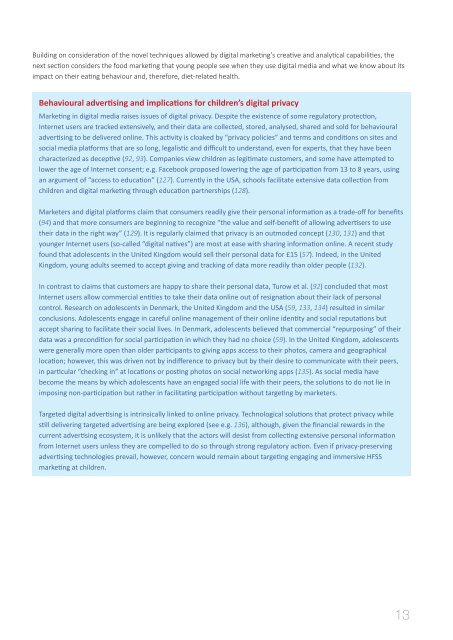2fyY1Py
2fyY1Py
2fyY1Py
You also want an ePaper? Increase the reach of your titles
YUMPU automatically turns print PDFs into web optimized ePapers that Google loves.
Building on consideration of the novel techniques allowed by digital marketing’s creative and analytical capabilities, the<br />
next section considers the food marketing that young people see when they use digital media and what we know about its<br />
impact on their eating behaviour and, therefore, diet-related health.<br />
Behavioural advertising and implications for children’s digital privacy<br />
Marketing in digital media raises issues of digital privacy. Despite the existence of some regulatory protection,<br />
Internet users are tracked extensively, and their data are collected, stored, analysed, shared and sold for behavioural<br />
advertising to be delivered online. This activity is cloaked by “privacy policies” and terms and conditions on sites and<br />
social media platforms that are so long, legalistic and difficult to understand, even for experts, that they have been<br />
characterized as deceptive (92, 93). Companies view children as legitimate customers, and some have attempted to<br />
lower the age of Internet consent; e.g. Facebook proposed lowering the age of participation from 13 to 8 years, using<br />
an argument of “access to education” (127). Currently in the USA, schools facilitate extensive data collection from<br />
children and digital marketing through education partnerships (128).<br />
Marketers and digital platforms claim that consumers readily give their personal information as a trade-off for benefits<br />
(94) and that more consumers are beginning to recognize “the value and self-benefit of allowing advertisers to use<br />
their data in the right way” (129). It is regularly claimed that privacy is an outmoded concept (130, 131) and that<br />
younger Internet users (so-called “digital natives”) are most at ease with sharing information online. A recent study<br />
found that adolescents in the United Kingdom would sell their personal data for £15 (57). Indeed, in the United<br />
Kingdom, young adults seemed to accept giving and tracking of data more readily than older people (132).<br />
In contrast to claims that customers are happy to share their personal data, Turow et al. (92) concluded that most<br />
Internet users allow commercial entities to take their data online out of resignation about their lack of personal<br />
control. Research on adolescents in Denmark, the United Kingdom and the USA (59, 133, 134) resulted in similar<br />
conclusions. Adolescents engage in careful online management of their online identity and social reputations but<br />
accept sharing to facilitate their social lives. In Denmark, adolescents believed that commercial “repurposing” of their<br />
data was a precondition for social participation in which they had no choice (59). In the United Kingdom, adolescents<br />
were generally more open than older participants to giving apps access to their photos, camera and geographical<br />
location; however, this was driven not by indifference to privacy but by their desire to communicate with their peers,<br />
in particular “checking in” at locations or posting photos on social networking apps (135). As social media have<br />
become the means by which adolescents have an engaged social life with their peers, the solutions to do not lie in<br />
imposing non-participation but rather in facilitating participation without targeting by marketers.<br />
Targeted digital advertising is intrinsically linked to online privacy. Technological solutions that protect privacy while<br />
still delivering targeted advertising are being explored (see e.g. 136), although, given the financial rewards in the<br />
current advertising ecosystem, it is unlikely that the actors will desist from collecting extensive personal information<br />
from Internet users unless they are compelled to do so through strong regulatory action. Even if privacy-preserving<br />
advertising technologies prevail, however, concern would remain about targeting engaging and immersive HFSS<br />
marketing at children.<br />
13






